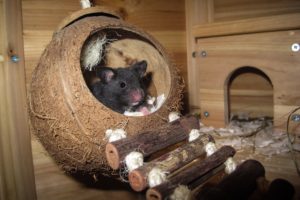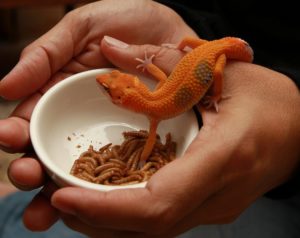4 Tips for Choosing a Starter Pet

Few people can resist the sweet eyes of a playful puppy. Little wagging tails, the tiniest sneezes, and round pink bellies are enough to melt any heart. The problem is when people think of owning a puppy, they think of the positives instead of the potential for ripped up furniture and accidents in the house. As a result, many people jump into owning a dog before they’re ready.
If you’re thinking of adopting a pet, make sure you know what kind of responsibility you’re ready for. There are plenty of starter pets who will bond with you just like a puppy while supplying practice for you to work your way up to a more difficult pet. Make sure you think about all your options before committing to any animal.
Here are 4 things to consider before getting a new pet:
One of the first things you should consider when adopting a pet is the amount of time you’ll be able to spend with it. Kittens require quite a bit of attention, but puppies especially will require the majority of your day. Considering bathroom breaks outside, three to four feedings a day, and a tons of playtime to bond with your pup and tire them out, a puppy won’t do well in a household that’s empty for a large portion of the day.
If you know you’ll spend long hours at work, in class, or have a busy schedule in general, a puppy might not be the best choice for you. Many rodents, such as rats and guinea pigs, are nocturnal and will happily snooze away while you’re taking care of your daily responsibilities. Also, many reptiles, for example snakes and lizards, don’t require constant interaction or daily feedings so if you’re looking for a low maintenance pet, those options will work will a busy schedule too.
2. Your Home
Another huge factor in choosing a pet is your living space. Cats usually do fine in an apartment as long as you have the space for a litter box (or multiple if you have multiple cats) and a cat tower or something similar for them to climb and play on. However, many dogs prefer a yard to run in, which isn’t available at every apartment complex. Big dogs especially aren’t likely to do well in an apartment, so if a St. Bernard is on your radar, it’s a good idea to wait until you have a better space to accommodate one. Caged animals like birds and rabbits can actually require a fairly large enclosure.
If you don’t have a ton of space for a rowdy puppy or a large cage, mice, gerbils, hamsters, insects, arachnids, and smaller breeds of lizards don’t take up too much room. These are all great starter pets while you’re working your way up to a more advanced animal. If you rent your home, make sure you always check your lease to see what animals are allowed before purchasing any pet. Don’t let your desire to have a pet cloud your judgment. Getting caught with an animal that isn’t permitted won’t just be trouble for you, but for the animal as well!
Beside the amount of money you’re able to spend on an animal, consider the amount of money you’re actually willing to spend. Some people have no problem spending hundreds of dollars on surgery for their guinea pig, while others find even just the thought of that ridiculous. A dog is certainly not going to be cheap, especially since they can be with you for up to fifteen years. You can expect to spend around $50 minimum per month just on food and other basic needs. Add in veterinary expenses and the costs add up quickly.
Though almost any type of animal will require veterinary care at some point in its life, a hardier pet might be a better choice for you if you’re not interested in draining your bank account. Pets like spiders, insects, and hermit crabs probably won’t end up at the vet, so that helps eliminate some costs. Remember that these pets, along with reptiles and amphibians, usually require some type of heating set up, which will be an additional cost, so look into rodents, birds, and fish as well!
4. Natural Instincts
If you’ve decided a starter pet is a better option for you, consider the natural inclinations of several different pets before making your choice. Rats, for example, are highly social animals that thrive much better in pairs or groups. So in this case, you’re looking at bringing more than one animal home. Some reptiles, on the other hand, are fine by themselves, but eat live food like crickets or mice. If that isn’t your cup of tea, it may be better for you to consider a different option. Do some extra research to decide which type of pet you’re most compatible with.
Furry, scaly, slimy, feathery, whatever your preference may be, we can all agree that pets are one of the greatest joys we have in life. We just have to remember that no matter how much we want to snuggle, spoil, and shower our little friends in kisses, they aren’t just play things. They’re living, breathing beings we’re committing to care for for their entire lives.
What was your first pet? Let us know in the comments!


